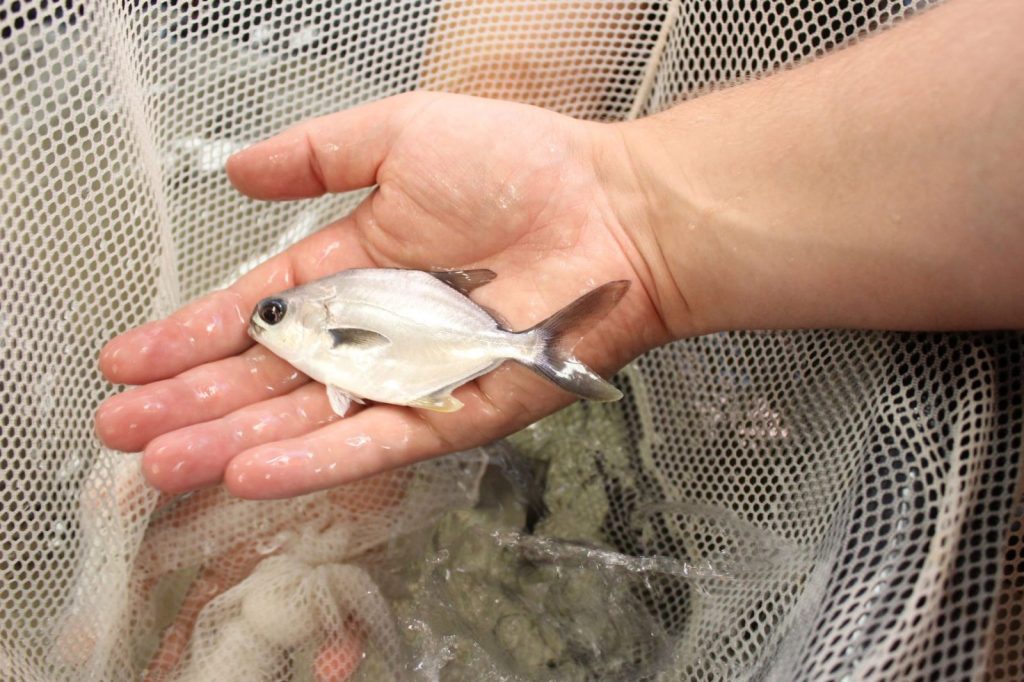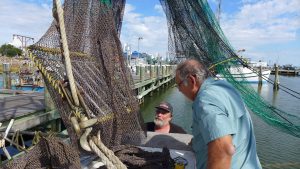Globally, aquaculture plays a significant role in seafood production, accounting for more than half of all seafood consumed by humans. In the U.S., aquaculture is increasing in importance and for over 50 years, Sea Grant has been a leader in promoting safe, strategic and sustainable aquaculture through research, education and extension. Whether it’s studying the scientific and social aspects of aquaculture or providing training and community support, Sea Grant’s efforts bring people together around American seafood.
In fiscal year 2023, Sea Grant invested $14 million in federal funding to support several new initiatives, including the Aquaculture Economics and Markets Collaborative, Aquaculture Technologies and Education Awards, Aquaculture Supplemental Awards and the previously announced Seafood Industry Workforce Development Awards. In addition, fiscal year 2023 investments supported the continuation of Early Stage Propagation Strategies for Aquaculture Species Awards, Marine Finfish Aquaculture Juvenile Production Technologies Awards, Advanced Aquaculture Collaboratives, and the Aquaculture Information Exchange.
“Developing and supporting aquaculture science and technology is a key component of Sea Grant’s work, ” said Jonathan Pennock, director of NOAA’s National Sea Grant College Program. “Our investments and partnerships strategically address a variety of challenges in the industry and demonstrate a continued commitment to supporting sustainable American aquaculture.
In fiscal year 2023, Sea Grant established the Aquaculture Economics and Markets Collaborative through a competitive funding opportunity. Virginia Sea Grant was awarded $998,920 in federal funds over two years to establish the collaborative, which will focus on advancing and enhancing aquaculture economics and marketing research and extension services. The project scope includes creating an economics and marketing portal, conducting assessments, developing data resources, providing training and building partnerships to strengthen the economic impact of the aquaculture industry. It also provides opportunities for junior faculty and graduate students to gain experience in multi-faceted research and extension projects.


Aquaculture Technologies and Education Awards
In fiscal year 2023, as part of the Aquaculture Technologies and Education Travel Grants competitive funding opportunity, Sea Grant invested $289,457 in six one-year projects at Sea Grant programs to support domestic or international travel activities of aquaculture researchers, extension personnel and industry members to facilitate knowledge exchange and expertise towards enhancing coastal, Great Lakes and marine-focused aquaculture. Learn more about these projects below.
Primary processing bottlenecks: addressing barriers for small to medium-scale seaweed production in the United States
Principal Investigators: Anoushka Concepcion & Melissa Good
Grant Amount: $49,997
This project aims to enable aquaculture extension and industry members to travel to the United Kingdom for outreach with experts and to transfer implementable solutions to address the need for food-safe seaweed processing for small to medium-scale seaweed operations in the United States.
Expansion of the Pier to Peer program for oyster (Crassostrea virginica) aquaculture farmers in the southeastern U.S.
Principal Investigators: Tom Bliss and Beth Walton (Oyster South)
Grant Amount: $49,999
This project seeks to revitalize the Oyster South Pier to Peer Program by providing oyster producers in the southern U.S. funding to visit other regional and national oyster farming operations to help expand learning and technology transfer.
Culinary exchange in support of the scallop farming industry in Maine and the northeast US.
Principal Investigators: Dana Morse, Togue Brawn (Downeast Dayboat), Rob Dumas (University of Maine), and Hugh Cowperthwaite (Coastal Enterprises, Inc.)
Grant Amount: $49,972
This project aims to promote the Northeast U.S. farmed scallop sector by educating processors and culinary experts on using different parts of the scallop in dishes and products. The project will provide oral, written, and visual outreach and fund travel for Maine aquaculturists to France to learn from experts in the French scallop industry.
Improving Aquaculture Literacy from Great Lakes to Great Seas
Principal Investigators: Lauren Jescovitch and Elliot Nelson
Grant Amount: $49,999
This project will continue to develop collaborations and key relationships to enhance Michigan State University Extension and Michigan Sea Grant with global aquaculture networks. Funds will support travel activities to help implement a place- and experiential-based program that focuses on building resilient and sustainable aquaculture practices and strengthens extension efforts with aquaculture literacy and workforce development between Indonesia and the U.S.
Training and educating auditors, extension agents and regulators on the Regional Shellfish Seed Biosecurity Program
Principal Investigators: Eric Herbst, Tal Ben-Horin (North Carolina State University), Lucia Safi and David Bushek (Rutgers University)
Grant Amount: $41,550
The project aims to create a community of stakeholders for the Regional Shellfish Seed Biosecurity Program in the southeastern and Gulf Coast states. It will also identify and train auditors by funding travel and educational workshops for auditors, extension agents, and regulators.
Great Lakes Aquaculture Decision-Maker Days
Principal Investigators: Nicole Wright, Kieran Smith, Amy Schrank, Donald Schreiner, Sharon Moen
Grant Amount: $47,940
The project aims to promote the growth of the Great Lakes aquaculture industry by including decision-makers as a way to explore opportunities. Funds will support organizing aquaculture decision-maker days that will involve state-based fish farm tours and forums for decision-makers to learn about aquaculture and its importance in the region’s agricultural landscape.


Sea Grant Aquaculture Supplemental Awards
Sea Grant provided $4.36 million in federal funding in fiscal years 2022 and 2023 for 28 aquaculture projects to support a range of aquaculture activities at Sea Grant programs focused on local priorities, including aquaculture extension, education or communication activities; a joint regional aquaculture research competition; a joint regional (or topical) aquaculture extension position; competitive exploratory aquaculture Program Development funds; and to support existing staff to expand their aquaculture activities. Learn more about these projects below.
Fiscal Year 2023 Aquaculture Supplemental Awards
Alaska Sea Grant received $162,778 in federal funding to hire an Alaska Sea Grant Fellow to work on mariculture-related topics and support the Alaska Mariculture Research and Training Center. The funds will also support travel for knowledge exchange trips, expanding the Alaska Sea Grant State Fellowships program and the Alaska Sea Grant FY21 Aquaculture Supplemental.
Connecticut Sea Grant received $88,602 in federal funding to hire a Shell Recycling Coordinator in Connecticut to engage public officials, community, and industry leaders to increase shell recycling in the state. This will aid in the restoration of oyster habitats and the ecosystem services they provide while promoting the sustainability of the shellfish industry.
Guam Sea Grant received $50,000 in federal funding to retain the aquaculture Extension Associate position at the Guam Sea Grant program, which encourages sustainable aquaculture practices that combine traditional knowledge with modern techniques. The associate will also represent the program in the Alaska and Pacific Region aquaculture working group and will conduct outreach activities to share research.
Illinois/Indiana Sea Grant received $47,499 in federal funding to enhance the aquaculture extension capacity of Illinois-Indiana Sea Grant by incorporating water quality testing into education and outreach programming. This is expected to improve the efficiency and effectiveness of ILINSG’s extension and outreach programming, benefiting aquaculture producers.
Maine Sea Grant received $30,810 in federal funding to update the Maine Oyster Trail Website regarding participating oyster farms and educational content about oyster aquaculture, tourism, and educational opportunities. Maine Sea Grant will also host educational events, presentations and workshops, as well as meetings and field-based tours to promote diversity, equity, inclusion, justice and accessibility.
Maryland Sea Grant received $278,625 in federal funding to expand the reach and quality of aquaculture activities that Maryland Sea Grant can support within Maryland, the Chesapeake Bay region, and nationally. Initiatives include a graduate student fellow, law and policy fellow, aquaculture education and professional development coordinator, shellfish hatchery manager and extension specialist, proposal and reporting coordinator, and travel and related support for conferences and workshops.
New Hampshire Sea Grant received $298,403 in federal funding to support an Aquaculture Extension Postdoctoral Fellowship aimed at building capacity to track research, strengthen industry relationships, and develop collaborative work. Research will also focus on understanding the variability of phytoplankton communities in coastal NH to improve aquaculture management and predict climate change impacts.
Mississippi/Alabama Sea Grant received $112,308 in federal funding to initiate the Commercial Oyster Aquaculture Sector Training (COAST) Program, a workforce development initiative aimed at recruiting workers to the oyster aquaculture industry. The COAST Program will train workers for the oyster aquaculture industry, focusing on sectors with the greatest demand, training a minimum of 10 interns, and evaluating and improving the program structure.
Puerto Rico Sea Grant received $59,818 in federal funding to establish alternative energy backup systems for land-based recirculating aquaculture systems at the University of Puerto Rico, Marine Science Field Lab, to prevent disruptions and damage to research caused by frequent power outages since Hurricane Maria in 2017.
Washington Sea Grant received $300,000 in federal funding to support two initiatives: the Willapa Bay-Grays Harbor Ecosystem-Based Management Collaborative and the Shellfish Farmer Readiness and Resources for Temperature Extremes project. The former involves supporting collaborative meetings and an interdisciplinary science advisory committee, while the latter focuses on establishing a rapid response network for shellfish managers and farmers to tackle temperature extreme events, hosting a workshop on climate readiness, and enhancing the Washington Sea Grant aquaculture website.
Wisconsin Sea Grant received $296,002 in federal funding to support strengthening connections between Wisconsin food fish producers and consumers, as well as identifying the winter thermal requirements for successful walleye reproduction. This work will benefit seafood consumers and walleye producers throughout the state.
Fiscal Year 2022 Aquaculture Supplemental Awards
California Sea Grant received $300,000 in federal funding to develop and refine the California Aquaculture Action Plan (CAAP), providing recommendations for a consistent, comprehensive and coordinated approach to approving aquaculture projects. Additionally, an extension specialist will be hired, working with the Scripps Institution of Oceanography (SIO) to develop research, education, and extension programs that emphasize opportunities and connections in San Diego County, amplifying aquaculture activities in Southern California.
Florida Sea Grant received $100,000 in federal funding to create an aquaculture fellowship program that allows graduate students to work with a team of Florida Sea Grant extension agents who work with state and federal agencies, municipalities, nonprofit organizations, local businesses, and members of Florida’s coastal community. The program will help identify issues in the offshore aquaculture industry in Florida, conduct research and applied communications, and share findings with stakeholders.
Georgia Sea Grant received $74,772 in federal funding to support four research projects, including (1) Improving the lives of Georgia Citizens through Investments in Aquaculture, (2) Emerging Vibrio campbellii and V. harveyi Pathogens: Detection Methods and their Validation, (3) Aquaculture Student Research Traineeship, and (4) Seasonal Microbial and Nutrient Survey for UGA Shellfish Hatchery and Skidaway River Intake.
Hawai‘i Sea Grant received $250,000 in federal funding to support an extension faculty position to promote sustainable and Indigenous aquaculture development in Hawai‘i and the Pacific region through outreach and technology transfer. The position will increase understanding and technological solutions to aid aquaculture management and production, establish partnerships, and increase knowledge of efficient and sustainable techniques for coastal and freshwater resource use.
Lake Champlain Sea Grant received $32,853 in federal funding to support extension activities that will help producers in the Lake Champlain basin improve their production systems by integrating technology and state-of-the-art methodology. The work will focus on topics such as aquaponic greenhouse pest management, water clarification, micro-algae additions, production expansion, and external grant-seeking assistance.
Louisiana Sea Grant received $124,289 in federal funding to aid in creating an easy and rapid tool that will enable oyster farmers to evaluate oyster performance during grow-out stages. A bioenergetic model will be developed to predict oyster production potential using different grow-out techniques and environmental conditions.
MIT Sea Grant received $93,648 in federal funding to provide insights that may improve the domestic market for seafood, in particular, identifying ways to engage underrepresented communities who consume higher than average rates of seafood but do not engage with local producers for their seafood needs. These funds will support a pilot program bringing together engineering students and aquaculture producers to develop robotic interventions for industry challenges. This program will advance the aquaculture industry while training the next generation of aquaculture engineers.
Minnesota Sea Grant received $103,809 in federal funding to enhance the Minnesota aquaculture industry in an eco-friendly, competitive, and sustainable way. Specific objectives include expanding indoor aquaculture systems to increase fish-rearing capacity, extending golden shiner bait production research, creating a producer-friendly guide to Minnesota’s aquaculture regulations, and launching a workforce development pilot program.
New York Sea Grant received $300,000 in federal funding to strengthen the state’s aquaculture industry by building relationships and creating a unified network of producers and stakeholders. The goal is to benefit the aquaculture industry as a whole and increase awareness of its value.
North Carolina Sea Grant received $134,921 in federal funding to support five research projects, including: (1) sustaining the North Carolina Shellfish Farming Academy; (2) understanding the economic impact and increasing public awareness of food-based tourism opportunities provided by the North Carolina Oyster Trail; (3) Beyond Appetizers: Oysters are for Entrees, too (developing entrees featuring oysters and conducting consumer outreach about nutritious oyster main-mail options); (4) Striped Bass Aquaculture: Enhanced Captive Breeding Strategies through Identification of Sex Pheromones in Striped Bass, Morone saxatilis; and (5) Coastal Aquaculture Communications and Outreach: Increased Resources and Public Awareness of Shellfish Mariculture and Coastal Development Challenges and Solutions.
Ohio Sea Grant received $80,000 in federal funding to expand consumer-focused aquaculture outreach and education by building community collaborations and connecting Ohio’s Land and Sea Grant resources. The work will establish relationships with the OSU Extension Family and Consumer Sciences program to explore consumer-focused aquaculture outreach and youth opportunities with aquaculture, leveraging existing tools, specifically the Great Lakes Fresh Fish Finder, and a new aquaculture literacy display at the Stone Lab and the Lake Erie Nature and Science Center, to create video content that is readily accessible for consumer and youth outreach and education.
Oregon Sea Grant received $239,569 in federal funding to hire an extension specialist who will support recently awarded aquaculture projects. The specialist will raise awareness of the needs, activities, barriers, and regulations related to shellfish and seaweed farming in Oregon, benefitting the state’s aquaculture industry.
Rhode Island Sea Grant received $185,183 in federal funding to improve Rhode Island’s aquaculture permitting process and advance sustainable practices by enhancing online resources, building stakeholder capacity, and providing technical support. Specific activities will include engaging stakeholders in understanding and applying best management practices for floating aquaculture gear, enhancing public dialogue and education on restorative aquaculture, and implementing Bay Management Plan recommendations. The project will streamline and enhance public engagement and build capacity for informed dialogue concerning best practices and innovations in floating gear.
Texas Sea Grant received $271,371 in federal funding to develop a cutting-edge genetic tool to monitor eastern oyster population structure in Texas inexpensively. Fine-scale mapping of the oyster population structure will be conducted and physiological tolerance information for two distinct oyster genetic groups will be gathered.
USC Sea Grant received $29,063 in federal funding to connect current and potential bivalve and seaweed producers in California with local communities participating in a regional Sustainable Seafood Hub that realizes the social, economic and environmental potential of low-trophic aquaculture, from seed to consumer. This includes hosting a free Sustainable Seafood Festival in Los Angeles, developing educational materials, and disseminating learnings to support the expansion of equitable aquaculture hubs across the U.S.
Virginia Sea Grant received $93,430 in federal funding to establish a genetic testing service center to aid hard clam industry breeding efforts. Research will be conducted to develop tools for identifying relatedness, hatchery strains, and parentage in crosses. Demonstrations will be conducted for the industry, and a framework will be created for offering the services via a testing center.
WHOI Sea Grant received $218,444 in federal funding to support a postdoctoral researcher at WHOI, who will focus on investigating a specific aspect of shellfish disease. The primary goal is to gain a better understanding of the particular pathogen, the disease it causes, and how to manage its impact on shellfish growers and resource managers.
Download the full list of funded projects and descriptions here and click here to learn more about Sea Grant’s investments in aquaculture.
Learn more and apply for Sea Grant’s recently released FY2024 National Aquaculture Initiative: Enhancing Production of Coastal, Marine and Great Lakes Aquaculture Species funding opportunity.


Amara Davis
Outreach Coordinator, National Sea Grant College Program



